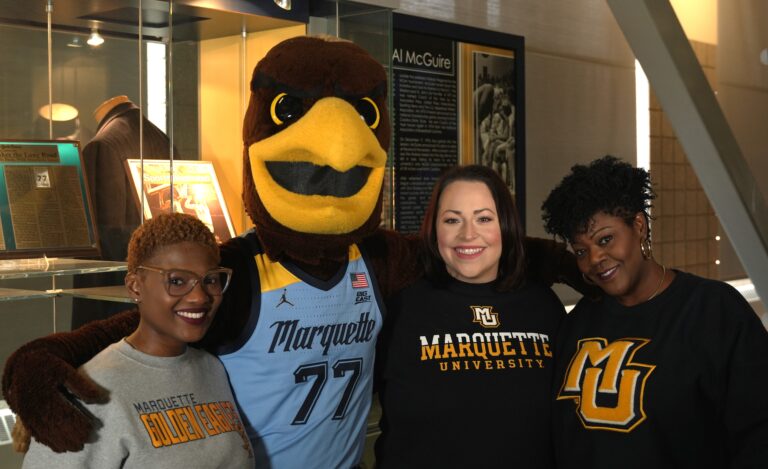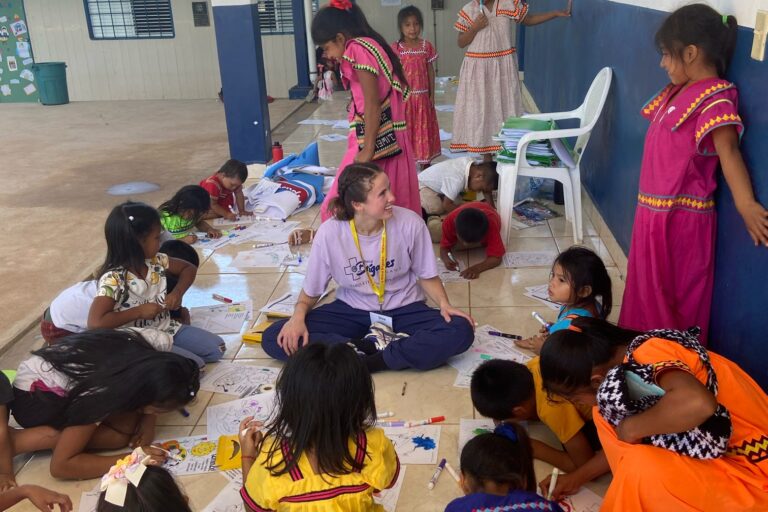
Fostering a campus community of belonging is vital to a positive Marquette experience for students, faculty and staff. Teon Austin, director of diversity and inclusion for the Marquette University School of Dentistry takes that charge seriously.
The Milwaukee native is a two-time Marquette graduate, having earned his bachelor’s and master’s degrees here; he is currently pursuing his Ph.D. in higher education leadership at Marquette. After working at Cardinal Stritch University for the past 11 years, Austin says he’s excited to rejoin the Marquette community and make a difference.
Here in a Q&A, Austin talks about his background and ways to advance a culture of diversity, equity and inclusion for dental students, faculty and staff.
You have a vast educational background in leadership. What made you choose that as your path? Why is that important to you?
I have spent my professional career helping to remove barriers to vocation and education and promoting equity and belonging. I grew up seeing the transformative power of education and the importance of leadership with a student-centered approach.
A leader is responsible for ensuring the standards of morals and ethics within their organization. Through my leadership education, I put myself in a position to inform organizational policies, procedures and practices. This is vital to ensuring that the culture and climate of any organization is the best for the most amount of people.
Representation in leadership is also very important. I have been able to connect with, inspire, mentor and educate students who share my identities and enrich the overall educational experience for students who do not. Diversity adds value to the student’s experience. This is what we hope to do at the School of Dentistry.
Being new to the role as the director of diversity and inclusion at the School of Dentistry, what’s your top priority? Where do you want to evoke change?
I hope to establish a framework of cultural humility, where individuals within the school are aware of how their cultural competence and the intersections of their identities (as well as their students) impact teaching, learning, research, engagement, client service and the overall student experience. With this mindset, our faculty and staff will be able to better serve students, foster better learning and serving environments, and incorporate the diversity of our community into our classrooms and clinics. Students then will be able to have a greater impact as professionals working with diverse clientele.
My steps toward working on this start with looking at what we do that aligns with these goals and analyze how we can increase or strengthen in these areas. The second step would be helping to inform policies, practices and educational opportunities that will help promote cultural humility and increase cultural competence. Creating opportunities to learn about, celebrate and promote diversity are key to my goals at the School of Dentistry.
How did your experience as a Marquette student help you achieve that change?
I believe that the allure of college is the promise of a transformative experience. For many underrepresented populations, the experience has been merely transactional — attend college to get a better job. This is because they have not been able to see themselves in faculty and staff or the social, cultural and educational climate. As a student, I had myriad experiences that both affirmed that I belonged in college (and at Marquette) and some that made me question if I belonged. In undergrad, I knew that the Educational Opportunity Program, a federally funded college access program, was a safe place that made me feel like I belonged on campus. EOP was a place that contributed to my growth culturally, socially and academically. I want the students I serve to feel this way.
You’re also in charge of the Dental Summer Enrichment Program. Explain what the program is all about and how it helps students.
The DSEP program serves as a bridge for students entering dental school and is beneficial for both the individuals and the School of Dentistry. Each year, 10 students have an opportunity to get a preview of their first year of dental school, learn about the School of Dentistry and the surrounding community. During this time, the DSEP cohort builds a bond with each other and with dental school faculty and staff.
How do you think the DSEP has impacted the School of Dentistry?
The students of DSEP go on to serve in leadership positions. They unofficially lead by helping the students who start in the fall get acclimated to the culture and climate of the dental school and the city. They officially lead by serving in leadership positions for their cohorts. Each cohort has appointed officers who plan and implement activities and serve as liaisons among the students, faculty and staff. Oftentimes, DSEP students step up to fill these roles.
You spent over 11 years at Cardinal Stritch University before the unfortunate closing of the institution — what skills or lessons have you brought with you to your position here at Marquette?
Relationships, connection to community, innovation and added value are vital to enhancing the student experience. It is important to establish and maintain relationships with our students. This was easier in a small school like Stritch but can be monumental in a larger school like Marquette where students may feel overwhelmed or disconnected from campus at times. Connecting students to the community allows for them to interact with individuals who represent their anticipated careers and various identities. These connections are vital to affirming who students are and who they will become. Lastly, you must always look for ways to be innovative and add value to the curriculum.
Name something about yourself that might be surprising to others?
I love teaching, photography and coaching basketball. Also, I have been on campus since I was a young child. My grandmother worked as a custodian, and I would walk around campus with my grandfather while we waited for her to get off work. Then I participated in precollege, undergrad, grad school, worked for EOP at Marquette and now I am back.
Is there anything else you’d like to add that I haven’t already asked?
The students, faculty and staff at the School of Dentistry are great people and have been working hard to maintain a culture of continuous improvement. I am excited to be a part of it and contribute any way I can.


